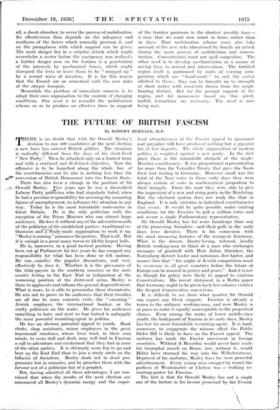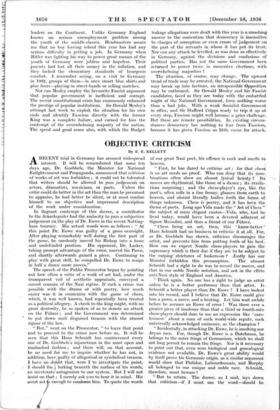THE FUTURE OF BRITISH FASCISM
BERNAYS, M.P. By ROBERT
THERE is no doubt that with Sir Oswald Mosley's decision to run 400 candidates at the next election a new force has entered British politics. The situation is radically different from the days of his short-lived " New Party." Then he attacked only on a limited front and with a confused and ill-defined objective. Now the offensive • is to be launched along the whole line of the constituencies and its aim is nothing less than the ,er conversion of British Democracy into the Fascist State. There has also been a change in the position of. Sir Oswald Mosley. Five years ago he was a discredited Labour Party politician who had singularly failed, when he had a peculiar responsibility for arresting the mounting figures of unemployment; to influence the situation in any way. Today he is the most formidable mob-oratm in Great Britain. He is the only politician with the exception of the Prime Minister who can attract large audiences. He does it without any of the adventitious aids of the politician of the established parties—traditional en- thusiasm and—rieady-made organisation to work it up. "Mosley is coming" announce the posters. That is all. But it is enough in a great many towns to fill the largest halls.
He is, moreover, in a good tactical position. Having been out of Parliament for five years he has escaped any responsibility for what has been done or left undone. He can _ean'alise the _ popular discontents, and very effectively he does it. Whether it is the grievances of the tithe-payers in the southern counties or the anti- semitic feeling in the East End or indignation at the worsening position of the distressed areas, Mosley is there to aggravate and inflame the general disgruntlement. What is more, he is able to personalise these discontents. He sets out to prove to his audiences that their troubles are all due to some concrete evils--the " sweating " Jewish employer, the international banker, or the crafty politician on the make. He gives his audiences something to hate, and next to fear hatred is unhappily the most powerful recruiting-agent in politics.
He has an obvious potential appeal to youth. Bank clerks, shop assistants, minor employees in the great impersonal combines, whose lives tend, in their own minds, to seem dull and drab, may well find in Fascism a call to adventure and excitement that they find in none of the other parties. It is obviously more fun to go and beat up the East End than to join a study circle on the fallacies of Socialism. Mosley deals not in dead pro- grammes but in crusades, and he preaches them with the fervour not of a politician but of a prophet. • But, having admitted all these advantages, I am con- vinced that when the results of the next election are announced all Mosley's dynamic energy and the super- ficial attractiveness of the Fascist appeal to ignorance and prejudice will have produced nothing but a gigantic list of lost deposits. The whole organisation of modern politics is weighted against a new party. In the first place there is -the formidable obstacle of the single- Member constituency. It was proportional representation far more than the Versailles Treaty that gave the Nazis their first footing in Germany. However small was the total of the Nazi votes in those early -days they were always certain of seats in mathematical proportion to their strength. From the start they, were able to give the impression of a new and rising party in the Reichstag. But the electoral system does not work like that in England. It is only victories in individual constituencies that count. It would be quite possible under existing conditions for the Fascists to poll a million votes and not secure a single Parliamentary representative.
- Sir Oswald Mosley has far more handicaps than any of the pioneering Socialists—and their polls in the early clays were derisive. There is his connexion with the most menacing features of the resurgent Germany. What is the decent, liberty-loving, tolerant, kindly British working-man to think of a man who exchanges messages of goodwill with Herr Julius Streicher, the Nuremberg district leader and notorious Jew-baiter, and assures him that "the might of Jewish competition- must be overcome in all great countries before the future of Europe can be assured in justice and peace." And it•is not as though his policy were likely to appeal to extreme Conservatism. His recent statement; in a• Berlin paper that Germany ought to be given back her colonies violates the deepest Conservative convictions.
It is difficult to see from what quarter Sir Oswald can expect any block support. Fascism is already a terror to the ordinary working-man, and now Mosley is at pains to make it equally unacceptable to the propertied classes. Even among the ranks of lower middle-class youth, the bodyguard of Nazism in its early days, Mosley has lost his most formidable recruiting-agent. It is hard; Moreover, to exaggerate the ruinous effect • the Public Order Bill is likely to have on the Fascist appeal. The uniform has made the Fascist movement in foreign countries: Without it Mussolini would never have made his triumphal march on Rome, nor, without it, would Hitler have stormed his way into the Wilhelmstrasse: Deprived of his uniforms, Mosley loses his most powerful advertisement. Every young man swagger!ng round the purlieus of Westminster or Chelsea was el walking re- cruiting-poster for Fascism.
The fact is that Sir Oswald Mosley has not a single one of the factors in his favour possessed by the Feseist leaders- on the Continent. Unlike Germany England knows no serious unemployment problem among the youth of the middle-classes. Headmasters assure me that no boy leaving school this year has had any serious difficulty in getting a job. In Germany when Hitler was fighting his way to power great masses of the youth of Germany were jobless and hopeless. Their parents had lost all their money in the inflation, and they lacked the elementary standards of bourgeois comfort. I remember seeing, on a visit to Germany in 1932, groups of them—in once smart blue shirts and plus fours—playing in street-bands or selling matches.
Nor can Mosley employ the favourite Fascist argument that popular government is inefficient and corrupt. The recent constitutional crisis has enormously enhanced the prestige of popular institutions. Sir Oswald Mosley's attempt last week to exploit the situation for his own ends and identify Fascism directly with the former King was a complete failure, and earned for him the contempt of the overwhelming majority of the nation. The speed and good sense also, with which the Budget leakage allegations were dealt with this year is a smashing answer to the contention that democracy is. insensitive to charges of corruption or even errors of judgement on the part of the servants in whom it has put its trust. Nor can any attack be levelled, as was done so effectively in Germany, against the divisions and confusions of political parties. Has not the same Government been returned to power twice in successive elections, with overwhelming majorities ? . .
The situation, of course, may change. The upward trend of trade may be arrested, the National Gdwernment may break up into factions, an irresponsible Opposition may be enthroned. Sir Oswald Mosley and his Fascist candidates, faced as they are today with the embattled might of the National Government, form nothing worse than a bad joke. With a weak Socialist Government in office, and Sir Stafford Cripps ready to trip it up at every step, Fascism might well become a grim challenge. But these are remote possibilities. In existing circum- stances democracy has nothing to fear from Fascism, because it has given Fascism so little cause for attack.











































 Previous page
Previous page